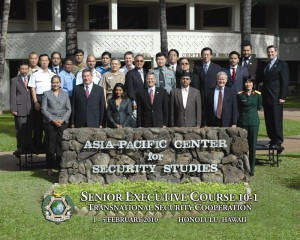
Twenty-two Fellows from 21 countries in the Asia-Pacific region will complete the Transnational Security Cooperation Course (TSC10-1) Friday, Feb. 5, 2010.
Twenty-two Fellows from 21 countries in the Asia-Pacific region completed the Transnational Security Cooperation Course (TSC10-1) Friday, Feb. 5, 2010.
They are military and civilian leaders representing: Afghanistan, Bangladesh, Fiji, France, Guam, India, Indonesia, Japan, Maldives, Marshall Islands, Micronesia, Mongolia, Nepal, Pakistan, Papua New Guinea, Republic of Korea, Singapore, Taiwan, Thailand, United Kingdom, the United States, and Vietnam.
The course is an intensive program for current and future senior regional influencers/leaders; military officers at the one- to four-star level, as well as their civilian equivalents from the Asia-Pacific Region. Curriculum emphasizes the impact of current and future change in the region, as impacted by regional and global security threats. Course includes guest speakers, interactive seminar workshop scenarios addressing complicated transnational threats, and discussions with Senior U.S. Pacific Command officials, all intended to share perspectives and further identify cooperative approaches to transnational security issues of common concern.
The Asia-Pacific Center for Security Studies is a Department of Defense academic institute that addresses regional and global security issues. Military and civilian representatives of the U.S. and Asia-Pacific nations participate in our comprehensive program of executive education, professional exchanges and outreach events, both in Hawaii and throughout the Asia-Pacific region. APCSS’ mission is to educate, connect, and empower security practitioners to advance Asia-Pacific security.
Since opening in 1995, the Asia-Pacific Center for Security Studies has had representatives from 72 countries attend courses at the Center.






I thoroughly enjoyed my time at APCSS. Meeting and interacting wih the APCSS employees was as always, most enjoyable an experience. It is at once an environment conducive for strategic thought processing and at once an opportunity to meet and develop long lasting networks that can make this world a better place for our future generations…let us share because we care..
I enjoyed during the course at APCSS, and also my first time visiting Hawaii. My major is nuclear engineering. This is my first time that I have to discuss with the Security Society in the area of regional security threats. I did not think before that I could contribute my knowledge to this TSC Course. It is my best experience that I have had. The most important thing is to have many opportunities such as making networking with other participants, developing regional coordination, etc. Thank a lot APCSS Staff….Together will be possible….